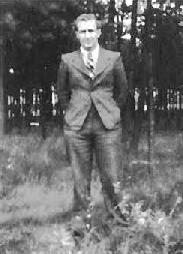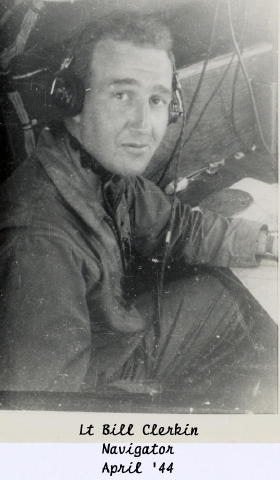William J. CLERKIN

Bill Clerkin at Bocholt (Foto Reengenoten Bocholt)

2nd Lt , US Army Air Forces
Service #: O-709469
Bomb Group: 92
Bomb Squadron: 407
Entered service: 8 - 1 -1943 Boston, Massachusetts
Hometown: Suffolk County, Massachusetts
Born: 4 July 1918 Massachusetts
Died: 11-01-2003 at Dedham
Burried at:
Bill Clerkin landed apart from Mel Crouch, Herbert Burbank, Stanley Jones and Fred Noble.
About one month after parachuting, Clerkin was captured by Gestapo in Antwerp and spent the remainder of the war as a POW (Prisoner of war) in Stalag 7a in Mooseburg.
From "The Path of a Warrior" written by Jetty Cook
Bill Clerkin bailed out near Meeuwen, some 12 miles east of where Jetty landed and hit in a haystack until the next day when he started walking westward. He soon met a young girl near Neerpelt who took him to a house, gave him food and left, but soon returned with two men who called themselves "Big Harry" and "Little Harry." Ten days later, the girl escorted Bill to Antwerp via tram where she left him in a park, telling him to wait for another escort who would take him to his next destination. Bill was soon approached by two men and one said in good English, "Are you ready to leave?" and Bill replied "Yes." He was taken to an apartment and, upon entering, Bill said, "I thought we were leaving the city." One of the men responded, "We will wait here until we take the train as it is safer than on the streets."
The men ask Bill his name, rank, crew position, etc. and he saw no problem answering these questions. But when they asked about the missions he had flown and the targets, bill got a little uneasy and told them, "I don’t think I should give you that information." They then ask, "Who helped you after parachuting?" Bill looked at his escorts and said, "You aren’t Belgians, are you? You’re Gestapo!" They smiled and said "Yes and you will leave for Germany tomorrow where you may see your friends ‘Big Harry’ and ‘Little Harry’ in a special prison we have for spies!" The date was August 2, 1944. Bill’s freedom had lasted two weeks.
The next day Bill and many other Allied airmen were herded into what he described as a cattle car and left for Germany. He was pleased to learn the sergeant in charge of the guard detail spoke English so he decided to use his best Irish charm in an attempt to win the German’s trust because "it may come in very helpful later."
Air raid sirens sounded as the train arrived in Frankfurt and the prisoners were herded to a nearby air raid shelter along with many German civilians who became quite angry when they saw the Allied airmen. Bill told Jetty, "They started beating some of us and I urged the German sergeant to shoot them. But the sergeant was a very poor sport," telling Bill, "I can’t do that. They are my own people." Bill told the sergeant, "Well, let me have your machine gun and I will shoot them!" The sergeant ordered the guards to form a ring around the airmen until the "all clear" sounded. Bill said "We were able to escape what I am certain would have been a very severe beating, if not death."
After interrogation at Oberursesl, he was taken to a POW camp at Sagan, near Dresden, the headquarters for German Stalag Lufts (POW camps-Air). There the POWs had a small radio so they could covertly listen to BBC for the latest news of the advancing Allied ground forces. They could also listen to RAF bomber fleet commanders flying small Mosquito bombers as they dropped in low over targets at night to guide pilots flying larger bombers to the target. On the night of February 13, 1945, Bill heard an RAF leader say "Come on, boys, come on in." The RAF started dropping their bombs on Dresden and Bill said "It was quite a show and I had a ringside seat. We were miles away when they started the sustained bombing but we could hear a loud, continual thunder, ,and our tin cups rattled on the wall."
This was the beginning of the total destruction of Dresden by Allied Bomber command. Eight hundred RAF heavy bombers attacked that night followed by 500 8th Air Force B-17s during the next two days. The first waves dropped high explosive bombs followed by others with incendiary bombs which caused an immense firestorm with tornadic winds. The once beautiful city all but vanished and an estimated 135,000 of its inhabitants were killed. Germany had reaped the winds of war it had sown five years earlier.
Hitler was furious and ordered the execution of all airmen POWs. Goering countermanded the order, unbeknownst to Hitler, but Stalag Luft-Sagan was ordered vacated immediately. Over the next two months, thousands of POWs were marched over the German countryside in a southerly direction. Bill told Jetty, "It was much like a Bataan Death March, except miserably cold. If you fell, they left you there. If you went over to help a guy, they bayonetted you or beat you with their rifle butts. It was a huge march of wounded, malnourished, freezing skeletons of men." About April 1, 1945, they reached Freisling, about 20 miles north of Munich, near Dachau.
Tens of thousands of Allied POWs were jammed into Freisling. The only shelter was what the POWs could construct from scrap, cardboard or a piece of canvas. Food consisted of one or two raw potatoes or turnips a day, a little stale black bread and perhaps, if they were lucky, a few scraps from the garbage of their guards.
One day Bill detected an aroma wafting from a hovel nearby and walked over to where five or six men hovered over a small pot over a fire. One man lifted the skeleton of a small animal from a watery soup and offered Bill some of their dinner. Bill told Jetty, "I was sorely tempted to partake in the meal, but declined as there wasn’t enough left for hardly a good taste." The next day he noticed that a big cat which had roamed about the camp for the last couple of days had disappeared and soon noticed a proliferation of rats and mice in the camp. Bill is certain the rats and mice also contributed toward sustaining some prisoners until they were liberated.
In May 1945 a tank of General Patton’s Third Army crashed through the fence and the tank commander stopped his tank, opened the hatch and yelled, "Where is my brother? I know he is in this camp." Bill told Jetty, "His brother was standing near me! Every man who witnessed their reunion burst into tear again, the first time being when the American tanks arrived."
A month later Bill was at his parents’ home recuperating from the effects of the war, especially the deprivation of food for over nine months. One day his mother searched the markets until she found a large T-bone steak, the ideal dish for a sumptuous dinner. After taking his first bite, Bill complained the steak was too tough to eat. "Then I suddenly started laughing. Only a month before I had been tempted to eat a feline stew and now I’m complaining about a steak!"
Bill Clerkin captured at Antwerp:



